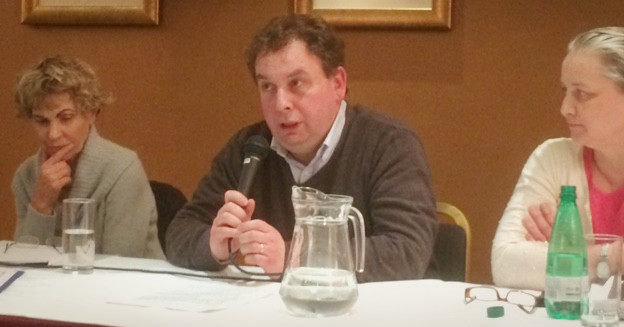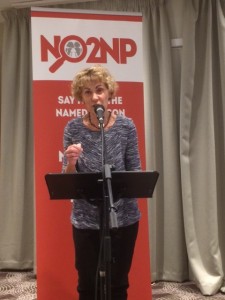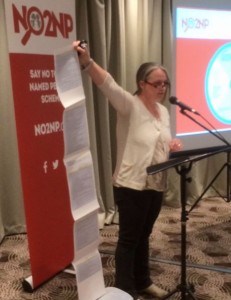Blog
Keeping you up to date on the progress of the Named Person scheme and the NO2NP campaign.
NO2NP ROADSHOW: COATBRIDGE
Posted 10 years agoThe roadshow team returned to the west of Scotland on Wednesday evening, when they held a well-attended meeting in Coatbridge. A good number of younger folk turned up for this one, including some secondary school children, who will of course all be assigned a Named Person.

Dr Jenny Cunningham, a local community paediatrician, challenged the First Minister’s contention that parents aren’t obliged to engage with the Named Person. She explained that the legislation makes it mandatory for every child to have a ‘state guardian’, and that children’s wellbeing will be “promoted, supported and safeguarded”, regardless.
Jenny went on to say that supporters of the scheme argue it’s about wellbeing, not child protection, yet when they are criticised, they always cite child protection as the reason why the scheme is necessary and accuse us of being against that! “Parental rights should not be treated so casually or dismissively” she went on. “They are one of the fundamental protections against state authority and tyranny over families – they’re the mark of a free society.”
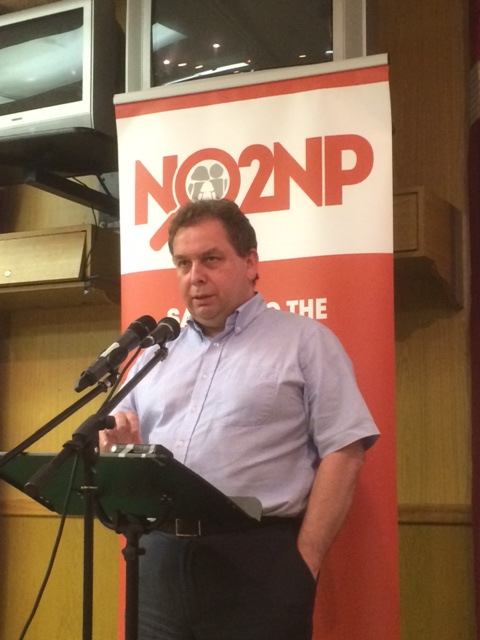
Gordon Macdonald from CARE for Scotland then summarized why NO2NP is opposed to the Named Person scheme: it’s universal, not “opt in” (indeed, there are no opt outs); it conflates welfare issues (risk of significant harm) with vague “wellbeing concerns”; and there are very broad data sharing powers, which don’t require the consent of the parent. Indeed, Named Persons are discouraged from raising the issue of consent with parents, in case it damages trust between them! Just keep them in the dark, then?!
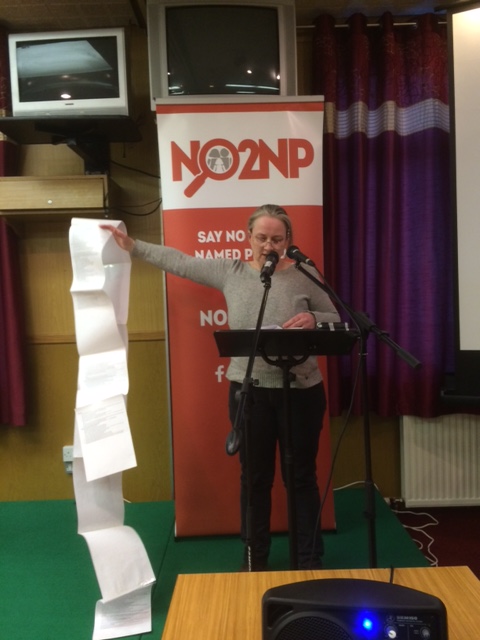
Next up was Lesley Scott from TYMES Trust, who took everyone through the detailed blueprint of young children’s lives that the Named Person will monitor with a view to ascertaining if any of the Government’s 222 risk indicators apply and whether the child should be put on a Child’s Plan, with the possibility of Compulsory Supervision Orders.
Lesley finished by saying: “The Named Person is not an entitlement; it is not simply a single point of contact. It employs a corruption of children’s rights to empower the state against parents, fatally undermining the autonomy of the family and handing the state free rein to intervene in family life whenever it feels it to be appropriate.”
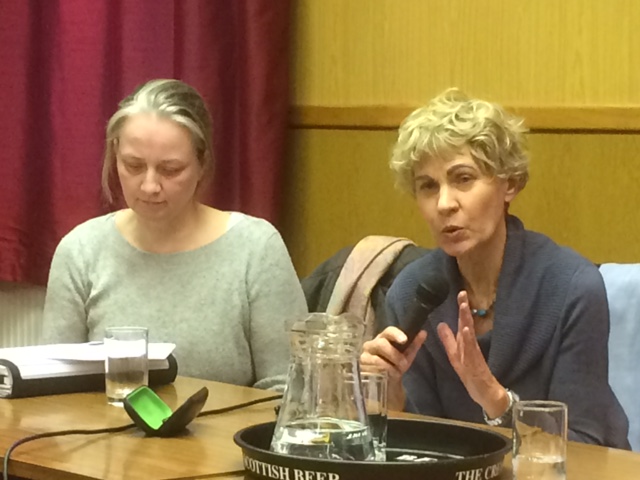
There was an excellent Q&A at the end, when people asked who was going to monitor Named Persons’ activities (nothing seems to be in place for this, beyond a complaints procedure). A social worker spoke eloquently about his opposition to the scheme and said that many of his colleagues would also speak out, but were fearful for their careers if they did.
A good number of folk signed up as NO2NP volunteers and others were happy to share their views with our cameraman – watch out for our vox pop video coming soon!
NO2NP ROADSHOW: FALKIRK
Posted 10 years agoA big thank you to all those who braved Storm Henry to come to the latest NO2NP roadshow event in Falkirk on Monday night!
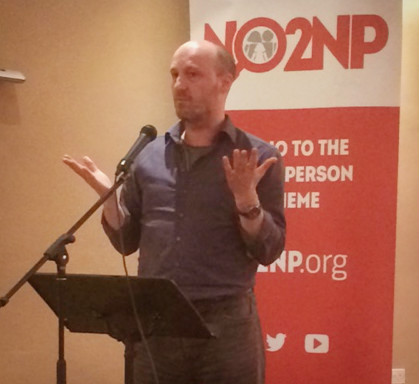
After Dr Stuart Waiton welcomed everyone, community paediatrician Dr Jenny Cunningham contended that children’s rights should not trump parents’ rights. “Parents are fully autonomous beings,” she said, “able to make their own decisions, while children are not. The principle of parental autonomy is fundamental to a democratic society.”
She went on to say that, far from respecting this parental autonomy, in recent years, social policy has seen parenting as “deficient” or “problematic” and there is a widespread consensus that the state has to intervene to address it.
Jenny emphasised that “there’s a world of difference between parental behaviour that puts children at risk of significant harm” and parenting that doesn’t fit the Government’s expectations.
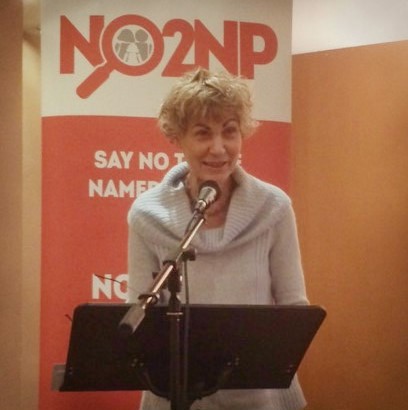
She said that “everything has been ‘GIRFEC’ed” [GIRFEC is the Government’s Getting It Right For Every Child framework] throughout health, education and social work. The legislation obligates all professionals to identify deficiencies in children’s lives and make decisions about whether their wellbeing is threatened and this is clearly seen in the new Universal Health Visiting Pathway, which will be introduced this August.
Jenny finished by saying that parenting isn’t a tick box list to be assessed by the state but a relationship between parent and child that grows at its own pace, as we are all individuals.
Lesley Scott from TYMES Trust then spoke about the recent decision of the Inner House of the Court of Session to reject our legal challenge. She quoted their use of the word “welfare” to describe the purpose of the legislation and showed how it is not interchangeable with “wellbeing”, but fundamentally different.

The Scottish Government has made this clear in their final statutory guidance, which states that “welfare and wellbeing are different, in that wellbeing is a broader, more holistic concept.” Even First Minister Nicola Sturgeon seems to be unsure about the purpose of the legislation, as she has said it is “about making sure that we are doing everything in our power to protect vulnerable children”. So, is it about child protection or children’s wellbeing?
On further scrutiny of the guidance, Lesley argued, there is “a dangerous conflation of the two [ideas]”, with the Information Commissioner’s Office conceding that there was a “lowering of the trigger” for data sharing from risk of “significant harm” to threat to “wellbeing”. This is confirmed in the guidance, which states that “a series of low level indicators of wellbeing need (whether obviously related or not) taken together can amount to a child protection issue”.
Lesley went on to point out, chillingly, that the guidance “is clear on the ability of Named Persons to use compulsion against parents and families who show any degree of non-engagement, non-compliance or mere ambivalence in the face of state functionaries’ opinions”. She went on to refer to sinister “compulsory supervision orders” which the guidance encourages Named Persons to use “at an early stage…to ensure compliance”.
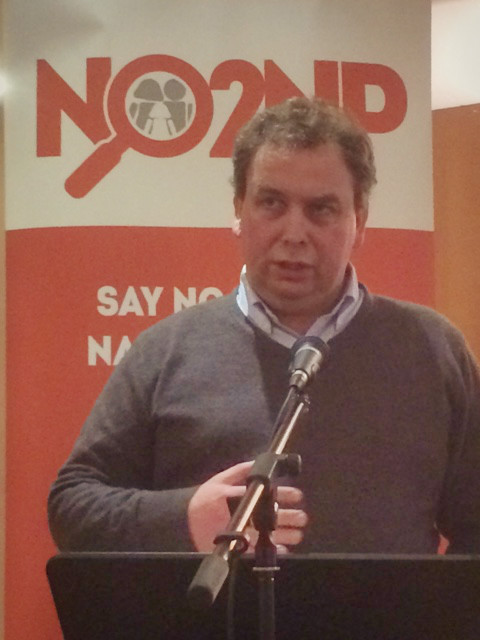
After a short video, CARE for Scotland’s Parliamentary Officer Gordon Macdonald, gave an overview of the passage of the Bill through Holyrood, stressing that it was really only children’s charities that were consulted and many of them tend to view families as potential problems. No consideration was given to religious liberty during the one morning given over to scrutinising the Bill, whose terms were applauded by the majority of the agencies invited to the session.
As a result, CARE and others involved in the NO2NP campaign, had no option but to go to court to seek to have the legislation overturned. Gordon suggested that the Court of Session had taken a “very optimistic view” of the legislation, but we were going to the Supreme Court in March and would, if necessary, go on to Strasbourg and Luxembourg, as the matter is so important.
Gordon concluded that there is a real risk of the scheme being operated in a “totalitarian” way, because individual children’s rights are being viewed in isolation from – and at times in opposition to – their relationship with their parents.
After some practical points were shared, there was an in depth Q&A, which brought out further revelations about the scheme, including that “wellbeing” was sometimes seen as whether children had sufficient “hope, love and spirituality” in their lives!
A dedicated group of volunteers will be in Falkirk’s High Street on Saturday morning for our latest Action Day, handing out flyers to shoppers and encouraging them to sign the online petition – if you are free to join us, please email volunteers@no2np.org.
NO2NP Roadshow: East Kilbride
Posted 11 years agoThe Arran Suite at the Holiday Inn, East Kilbride, was filled to capacity for the latest NO2NP Roadshow event before the summer break.
Community paediatrician Dr Jenny Cunningham told those gathered that concerns about the scheme were far more than questioning a different health model or budgeting constraints: it is about scrutinising families and undermining parental autonomy, which is the basis for a democratic society, she said.
She went on to explain that the role of the community paediatrician has been redefined by this legislation. While previously 80% of her work was about various disabilities in children, and only 20% about vulnerable children, now 70-80% of her work has to do with assessing vulnerability through the SHANARRI ‘wellbeing’ indicators.
SHANARRI stands for; safe, healthy, achieving, nurtured, active, respected, responsible and included.
She finished by saying that she and many of her colleagues were very concerned about the new obligation to share confidential information.
Next up was Lesley Scott of TYMES Trust, who said she had watched a video on South Lanarkshire Council’s website about young children and the importance of good attachment. Yet nothing was said about parents and children or families.
Lesley went on to explain – and display – the 13 pages of “outcome signifiers” to wellbeing that the University of Edinburgh had drawn up. South Lanarkshire Council had also produced 398 pages of guidance for named persons and Lesley queried whether everyone would interpret it the same way. The guidance estimates that 20-30% of children and young people will require additional input from state agencies.
Lesley expressed her concern that there is no facility for parents or children to disagree with the Named Person’s professional assessment of what is “needed” and parents will have no control over the ever-changing standard of parenting to which they will be held.
There was a very lively and extended Q&A, where several people questioned whether Named Persons knew anything about the real world of parenting, especially when some of them may have no children of their own.
The NO2NP Roadshow will be taking a break for a few weeks over the summer, but do watch out for further events we have planned for later in the year!
In the meantime, a big thank you to everyone who has come to these Roadshows – please continue to tell your friends about the campaign and encourage them to sign the petition.
NO2NP Roadshow update
Posted 11 years agoLast night (26 Feb) the NO2NP roadshow visited Cumbernauld. The event was chaired by Dundee-based sociologist, Dr Stuart Waiton, who spoke about the spiralling bureaucracy in health and safety.
The first speaker was community paediatrician, Dr Jennifer Cunningham, who explained the ‘SHANARRI’ wellbeing indicators. She noted that vulnerability had been widened considerably, with factors such as inactivity, poor nurturing and irresponsibility being examined, rather than simply abuse or neglect. She said many parents were losing confidence in their ability to raise children.
Next up was Lesley Scott of Tymes Trust, representing families of young ME sufferers. She examined the wellbeing indicators in more detail, and emphasised that there was no opt out from the named person. She voiced concern that non-engagement will lead to further interventions and said the scheme was state-mandated parenting.
The next NO2NP roadshow will be in Dingwall Town Hall on Wednesday 4th March at 7:30pm. Speakers will include Alison Preuss of Schoolhouse and Lesley Scott. Hope to see you there – all are very welcome.
NO2NP Roadshow review: Aberdeen & Irvine
Posted 11 years agoThe two latest outings of the popular NO2NP roadshow were in Aberdeen on 15th October and Irvine, North Ayrshire on 23rd October.
At the Aberdeen meeting, supporters heard from Liz Smith MSP, Young People spokesperson for the Scottish Conservatives. She described the named person policy as “slightly sinister” and argued that resources would be diverted away from the most vulnerable, hence defeating the purpose of the policy. She also said it was ridiculous that children aged over 16, who were recognised as adults, still required a named person.
Next up was Maggie Mellon, a consultant and writer on social work and children/family issues. She said that government shouldn’t get involved in parenting, and lamented a preoccupation with risk and safety.
The audience were also addressed by Lesley Scott, representing Tymes Trust, who work with children suffering from ME. She said it was unclear what will happen when parents and the authorities disagree and that it would be a “minefield” for parents who choose not to engage. She also explained that the threshold for intervention had been lowered from risk of significant harm to the ‘SHANARRI’ indicators.
In the chair for the evening was Dr Stuart Waiton, a sociologist from Abertay University, Dundee, who expressed his concern that children may go to their named person to complain about their parents and that the authority of parents and families could be undermined.
The meeting in Irvine was addressed by Glasgow-based community paediatrician, Dr Jenny Cunningham, who explained that every child in Scotland would be assessed through the ‘SHANARRI’ indicators and that the legislation would oblige all health, education and social work professionals to identify any deficiencies in parenting and to arrange intervention. She also spoke of her concern about the impact of the named person on family life and said that parents were intimidated by the idea.
The next talk was given by Anne Cannon, a Glasgow-based mother of five, who said her two main concerns with the named person policy were the negative impact it would have on the relationship between parents and state agencies, and the fact that it would fail the very people the policy is meant to help.
The meeting was also addressed by local man, Councillor Tom Marshall, who sits on North Ayrshire Council. He spoke about the appalling ‘ChildrenCount’ surveys which have been operating in North Ayrshire and outlined some of the questions being asked of youngsters.
The next stop for the NO2NP roadshow will be PERTH (Salutation Hotel) on 12th November at 7:30pm, followed by MONTROSE (Park Hotel) on 26th November at 7:30pm. We hope to see you there.
NO2NP Roadshow: 3 more dates in October
Posted 11 years agoFollowing on from the success of the initial ‘No To Named Persons’ (NO2NP) roadshow meetings during August (in Glasgow, Dundee and Stirling) the tour resumes in October with three more dates. These are:
INVERNESS – Wednesday 1 October @ Glenmoriston Town House, 20 Ness Bank
ABERDEEN – Wednesday 15 October @ ACT Aberdeen, 33 King Street
IRVINE – Thursday 23 October @ Gailes Hotel, Marine Drive
Events will feature contributions from a range of experts such as Dr Stuart Waiton (Abertay University), Maggie Mellon (social work consultant/writer) and Dr Jenny Cunningham (Community paediatrician). There will also be an extended time of discussion where attendees can put their questions to the speakers.
All events will begin at 7:30pm, are free entry and open to all.
Please come along and spread the word.
NO2NP Roadshow kicks off in Glasgow
Posted 12 years agoFollowing on from the hugely successful launch of the No to Named Persons (NO2NP) campaign in Edinburgh back in June, the NO2NP roadshow kicked off in Glasgow last Thursday night (21 August).
A large crowd gathered at the St Mungo Museum of Religious Life & Art, close to the city centre, to hear various speakers explain why the Scottish Government’s plan to furnish every child in Scotland with a state-appointed named person is woefully misguided and has the potential to cause significant damage to ordinary families.
The meeting was chaired by Dr Stuart Waiton, a sociologist from Abertay University. Highlighting the importance of the campaign, Dr Waiton told the meeting: “I expect 90% of parents in Scotland don’t know this law exists.” He also condemned the current obsession with child safety issues, remarking that: “there is an unhealthy anxiety about child safety.”
A keynote speaker was Maggie Mellon, an independent consultant and writer on social work and child issues. She said the legislation “represents a denial of families” adding that “we have separated children and their rights from families and their rights”.
She was followed by Dr Jennifer Cunningham, a Glasgow based community paediatrician, who argued that the legislation would have the “effect of obliging all professionals to identify deficiencies in parenting and arrange intervention.”
This was echoed by mother of five Anne Cannon, who said: “I don’t believe this legislation will empower parents.”
The audience also participated in a wide ranging discussion with the panellists.
The next stop for the roadshow is Dundee this Wednesday (27 Aug), followed by Stirling (29 Aug) and Inverness (1 Oct), with further dates likely. Full details are available on the NO2NP website.






